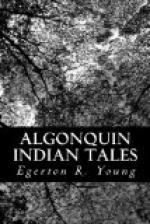Mary met them as they landed and her quick eyes detected the change in their spirits, and as they wore their hearts on their sleeves for her she quickly found out the cause of their sorrow. She was not slow in availing herself of the opportunity afforded of giving Souwanas and Kennedy a vigorous scolding for nearly breaking the hearts of her precious darlings, by killing in their presence some of the birds whose play they had often watched for hours together.
The two men took her scolding in their usual silent way, and then had a quiet laugh together when her wrath had exhausted itself and she had indignantly walked off with the children.
CHAPTER XXII.
Nanahboozhoo’s Ride on the Back of the Buzzard, who Lets Him Fall—A Short-lived Triumph—Why the Buzzard has No Feathers on His Head or Neck.
One beautiful warm day, when the leaves of the trees were all bright and golden with their autumnal tints, the children were visiting at the tent of Souwanas.
The old man was making a beautiful little bow and a quiver full of arrows for Sagastao while the old wife was manufacturing an elaborate baby cradle, of the Indian pattern, for Minnehaha, in which she could carry her favorite doll in the style popular among the Indian girls.
The children were much interested in watching these highly-prized gifts being prepared for them, and of course had much to say in the way of thanks to those who were doing so much to add to their happiness.
While they were thus busy several canoes were seen coming from the south. As the wind was favorable sails had been improvised out of blankets, each fastened to a couple of oars, and with these simple appliances they sped rapidly along. Seeing Souwanas’s wigwam on the point of land the Indians came to the shore and smoked and chatted for a short time ere they resumed their journey toward the north.
[Illustration: The Indian story-teller.]
They had in their canoes quite a variety of game, and among them a large ill-smelling bird called a turkey-buzzard. It was said that the young Indian hunter who had shot it thought at first that it really was a turkey, but he found out his mistake when he went to lift it from the ground where it had fallen. The odor was so offensive that at first he thought he would leave it behind, but when he remembered that often some of the large feathers were used in ornamental work he decided to bring it along.
The children were interested in its appearance, as this was the first dead turkey-buzzard they had ever seen.
“Look, Souwanas,” said Minnehaha, “the poor birdie has no feathers on its neck or head. It must be very cold there when the winter comes.”
“Well, I think that, as likely as not, it was its own fault that it lost its feathers,” said Sagastao, and then he added as he poked the rank bird over with a stick:




